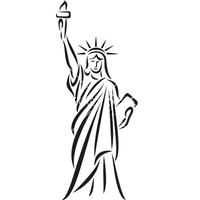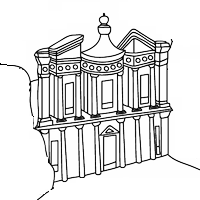
Emma Lazarus
Biographie
Born July 22, 1849 in New York, Emma Lazarus was the fourth child of the seven that have been Moses Lazarus and Esther Nathan, an American family of Portuguese origin living in New York since the colonial period. Originally the family had fled the Portuguese Inquisition. Formerly specializing in sugar refining, Emma was born into a relatively wealthy family in New York, she grew up in a stately home in Union Square. From her mother she is related to a judge of the Supreme Court of the United States, Benjamin N. Cardozo. Her Jewishness, of Sephardic origin, played a big role in her writing career, she has influenced in her policies and public action.
Emma receives a rich and comprehensive education, she has a tutor that opens at the World Knowledge. She is particularly interested in writing. From an early age, Emma shows exceptional abilities in literature. It takes a closer look at the US and British literature and learns several languages, including German, French and Italian. She began writing poems to be published by her father. This collection was noticed by Ralph Waldo Emerson who introduced the literary circles and became New Yorkers also her mentor. She published another volume of poetry, "Admetus and Other Poems" (1871) and a novel, "Alide: an episode from the life of Goethe" (1874) and a verse drama, "The Spagnoletto" (1876). After reading the novel "Daniel Deronda" by George Eliot (1876), a novel that explores Judaism in Victorian society, Emma Lazarus began to translate the medieval Hebrew poetry after the German Jews and some tests in favor a homeland in Palestine, this thirteen years before Theodor Herzl founded the Zionist movement. Her most important work is a book called "Songs of semite" composed poems on Jewish themes and lyrical dramas celebrating the Jewish courage and advocate the idea of a Jewish nationality. She studied Hebrew and translated classical Hebrew poetry of the great literary figures of the golden age of Spain, including Judah Halevi and Solomin ibn Gabirol. Many of her translations were later incorporated into the books of standard prayers. Emma also works regularly in the Jewish press, in the weekly "American Hebrew".
In 1880 she moved about the fate of Jewish emigrants to the United States and began to publish articles in the local press to support them, more strongly after 1881 and the arrival of Russian migrants in 1881 following the assassination Tsar Alexander II (Episode pogroms). It must be said that this murder preceded a wave of anti-Semitic violence, the Russian Jewish population tempting to take refuge in the United States. In 1882 she published Semitic books on the subject. Taking to heart her new role welcoming, she opened a refugee center for Jewish poor and helps the opening of the Hebrew Technical Institute of New York, which was tasked with providing vocational training for those not having no ability to work and offer them autonomy. On the island of Ward, she worked as an assistant for Jewish immigrants who had been arrested by immigration officers of Castle Garden. She was deeply moved by the plight of Russian Jews she met there and these experiences have influenced her writing. It must be said that these immigrants were very different from the Jews of the upper class of New York she used to rub. She was particularly surprised by the assimilated American Jews who seemed embarrassed by these Jewish refugees, at that time many American Jews did not want to be associated with these newcomers simply because they were afraid that these "different Jews" weaken their own social status, compromising their ability to assimilate into American culture.
She continues in parallel her literary career published numerous poems. She also does translations of German poems, mostly those of Johann Wolfgang von Goethe and Heinrich Heine. She also wrote a novel and two plays in five acts. In 1883, with the pace of raising funds for the erection of the base of the Statue of Liberty, it shall, on the request of William Maxwell Evarts and the author Constance Cary Harrison, so she wrote a sonnet named "The New Colossus" and for the auction for the benefit of the exhibition "Loan Fund to the pedestal the Statue of Liberty by Bartholdi" ("Loan Fund Exhibition in Aid of the Bartholdi Pedestal Fund for the Statue of Liberty "). After being published in the New York World of Joseph Pulitzer and The New York Times, and have obtained great popularity, the sonnet slowly erased from the collective memory. It was not until 1901, 17 years after the death of Lazarus, that Georgina Theodora, one of her friends, finds a book containing this sonnet (in a bookstore!) And manages to revive the work once thought lost. Her efforts bore fruit in 1903 with the creation of a large copper plate on which was engraved the sonnet, and the visitor can see a wall of the museum of the statue in the base itself.

The New Colossus
In 1883 she makes a first trip to Europe. In March 1885 her father died, and two months later, in May 1885, it makes a second trip, still in Europe (Italy, UK). She will reiterate such a trip in September 1887 that it will return strongly weakened. Emma Lazarus died two months later, on 19 November 1887 in New York, at the age of 38 years. She is buried in Beth-Olom Cemetery in Brooklyn.
Emma Lazarus has been all her life an important precursor of the Zionist movement in the United States. She called for the creation of a Jewish homeland thirteen years before Herzl began to use the word "Zionism" well before it was popularized. She was honored by the Office of the President of the Borough of Manhattan in March 2008 and her house on 10th Street West is part of the circuit on the history of women's rights and historic sites. In 2012 the Museum of Jewish Heritage features at a special exhibition. She was also one of the first admirers of Henry George.
Emma Lazarus has a memorial in New York, it is a Battery Park, just south of Manhattan. Its exact address is Neighbourhood Financial District, NY, US, United States. It is a bronze plaque dating from 1955 donated to the town by the Organization of Jewish Women of Federations.
The New Colossus
Here is the poem in its original language, English. Its french translation and explanations of the poem are on a dedicated page.
The New Colossus
Not like the brazen giant of Greek fame
With conquering limbs astride from land to land;
Here at our sea-washed, sunset gates shall stand
A mighty woman with a torch, whose flame
Is the imprisoned lightning, and her name
Mother of Exiles. From her beacon-hand
Glows world-wide welcome; her mild eyes command
The air-bridged harbor that twin cities frame,
"Keep, ancient lands, your storied pomp!" cries she
With silent lips. "Give me your tired, your poor,
Your huddled masses yearning to breathe free,
The wretched refuse of your teeming shore,
Send these, the homeless, tempest-tost to me,
I lift my lamp beside the golden door!






















